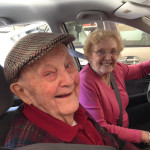Older Adult Couples and Preparing Well
 Two Bodies, One Person by Alan Millikan
Two Bodies, One Person by Alan Millikan
Couples. Do you know a couple that seems to be one person? One starts the sentence, the other finishes it. One cooks, one cleans. One drives, one navigates. One loses stuff, the other finds it. One is the life of the party and the other one brings the chips.
As couples grow older together, the “one person” phenomenon seems to become less of a precious nuance and more of a necessity. One can see, one can’t. One drives the car and the other is furious and frustrated that they have lost their license. One can hear, the other needs aids. One fills the pill boxes and the other one takes them when reminded. One can reach … and tie … the shoe laces and the other has arthritis.
What happens when this symbiotic, mutual dependency loses one of the “can” sides of the equation? The visionary has to have cataract surgery. The driver fails the driver’s test. The listener gets the flu and can’t go to the doctor’s appointment. The pill box spills and the resident pharmacist is on a three-day golf trip. The flexible one tears a rotator cuff. . .
Things happen. Yet for older adults, these normal aging events can send the previously functional couple into a crisis that can spiral out of control quickly. It can also create anger when the couple who was used to their independence is now is being forced into requiring some kind of help.
Sometimes the uncertainty can lead the couple to try to hide the fact that they are struggling with the change, and say they are “fine”. Sometimes they can make their way through the short term chaos and come out unscathed. Sometimes a daughter or son must leave their full-time job for a bit and move in for a week or two. Sometimes the neighbor makes a call to the church saying they are worried about Bill and Marge. Sometimes a disaster happens and previously stealthy interdependence is exposed.
Not many couples are going to be so lucky as to live to 93 and die together while scuba diving in Belize. Something is going to happen to cause one person to hit a road block first. Just a little advance thinking goes a long way. Preparing for possibilities is always beneficial. This preparation doesn’t have to be morbid or depressing. It is just sensible. And it makes it a lot easier to do something when you are not forced to by a crisis.
Talk about your existing and potential needs with your family and friends. If you are retiring or downsizing, think about a universal design home that has zero entry showers, wide doorways, and minimal steps. If you have known chronic medical conditions, talk to your providers about “what happens when . . . “ Look at care options and life management services. Share your fears and laugh about reality.
Give yourselves the gift of being prepared for what may come.



